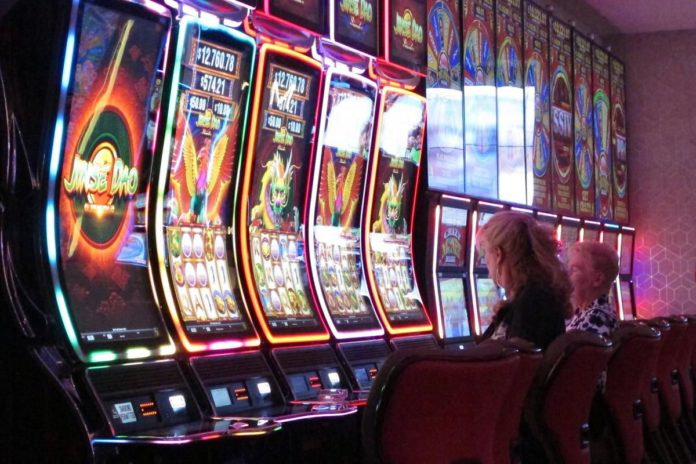/https://www.thestar.com/content/dam/thestar/sports/2021/05/07/his-gambling-was-out-of-control-10-years-ago-now-hes-a-responsible-gaming-analyst-for-an-international-igaming-company/slot_machines.jpg)
Jason Applebaum knows too well the allure that gambling can have on a person.
As a dealer at Fallsview Casino in 2011, Applebaum would work his eight-hour shift and then drive across the border to gamble for hours at the Seneca Niagara Casino. He says he went “a year and a half without winning” at the card tables and slot machines. He took out a $10,000 loan at 30 per cent interest so he’d have more money for gambling.
“I was at Fort Erie casino (another time) playing the slots,” Applebaum, on a Zoom call from his apartment in downtown Toronto, said this week. “Within 10 minutes, I’d won $600 and I phoned a friend to gloat. He’s like ‘that’s good, now leave.’ I’m thinking ‘what do you mean, leave? That ($600) means I get to gamble all night.’ ”
As Applebaum told the story of his struggles with gambling, the proposed Safe and Regulated Sports Betting Act (Bill C-218) was going through opening debate in the Senate. The pending legalization of single-event sports betting in Canada — which could come as early as the end of this month — is expected to attract a deep pool of new gamblers placing wagers on their favourite teams and athletes. Governments, sports leagues and organizations, media, data and technology companies, and other stakeholders are already positioning themselves for their piece of the billions of dollars projected to flow from a regulated sports betting industry.
“It’s long overdue and Canadians will be better off with a legal market,” said Paul Pellizzari, the vice-president of global social responsibility for HardRock International who studied responsible gaming as a researcher and an author before joining the Ontario Lottery and Gaming Corporation (OLG) in 2007 to create PlaySmart and other social responsibility programs.
Pellizzari played a leading role in the creation of the award-winning PlayersEdge, a gambling literacy and education program launched almost two years ago by HardRock International and Seminole Gaming. Unlike most responsible gambling programs, which focus almost exclusively on problem gamblers, PlayersEdge provides an across-the-board education strategy for new and casual players to seasoned regulars and anyone at risk of becoming a problem gambler.
According to Pellizzari, it’s good business for all stakeholders in a regulated sports betting and gaming world to provide information and safeguards to bettors.
“Canada is acknowledged as a leading jurisdiction in social responsibility,” said Pellizzari, pointing to lottery and gaming programs already being operated by provincial bodies across the country.
“Online sports wagering has been around for a long time; it just hasn’t been regulated and people get concerned about it because you can access it 24 hours a day. You want to get people into the habit of controlling their time and money (on sports betting).”
In Ontario, the province’s Alcohol and Gaming Commission has been receiving input from sportsbooks, sports organizations and other participants on what a regulated industry will look like, including responsible gambling initiatives.
“The U.K. is an industry leader when it comes to minimizing the harm from gambling,” said Applebaum, today a responsible gaming analyst with NSUS Group, an international iGaming company. “When (a bettor) crosses a certain threshold, they need to supply three months of bank statements showing income. The U.K. Gaming Commission has strong-armed the industry and said ‘these are our rules and you have to work within them.’ ”
Applebaum and Pellizzari each offered their own words of wisdom for sports betting novices.
“Set a budget, don’t chase your losses and understand gambling,” said Applebaum. “Betting $20 on a Leafs game here and there isn’t going to break you. But when you constantly do it . . . it doesn’t give you the same feeling and now you’re going to bet on two games, three games, parlays. And with all of the (online) sports sites, they have casinos and slots, so you’re going to dabble on those.”
Added Pellizzari: “Don’t see it as a way to make money, but as a way to enhance your entertainment value. And have a yearly budget for sports wagering.”
Applebaum’s experiences in sports betting have been limited to placing the odd wager during past trips to Las Vegas and playing Pro Line during the pandemic (”I’ve needed something to help pass the time”). With the tables and slots, however, he had realized by 2011 that his gambling was out of control. Applebaum found a recovery strategy “after many trials and errors” that included researching problem gambling and “educating myself on how casinos and gambling actually worked.”
Following four years of staying away from the slots and tables, Applebaum relapsed and a friend at work recommended a therapist. One month into his therapy, he discovered the root cause of his problem.
“I ended up coming out to her,” he said. “I’ve known I was gay since 12, 13 years old (but) in high school in the ’90s nobody talked about LGBTQ issues. I didn’t know any other kid or adult who was gay. We worked for six months at breaking down the wall I put up to stay in the closet.
Loading…
Loading…Loading…Loading…Loading…Loading…
“I was medicating myself through gambling to make myself feel normal. The casino was my safe place.”
And how does Applebaum describe his relationship with betting today?
“I would describe myself as someone who has an awareness of the benefits of gambling, but who understands the harms it can create within my life.”
JOIN THE CONVERSATION







